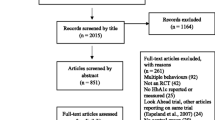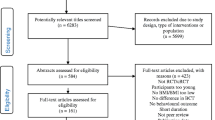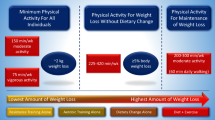Abstract
Background
Although experts claim that computer-tailored interventions provided over the Internet have great potential to promote health behavior change, few studies have tested the efficacy of computer-tailored lifestyle interventions online-delivered over the Internet.
Purpose
To evaluate the short-term (1 month) efficacy of an Internet-delivered, computer-tailored lifestyle intervention targeting saturated fat intake, physical activity (PA), and smoking cessation, and to evaluate exposure to the intervention.
Methods
A pretest–posttest randomized controlled trial with an intervention group and a no intervention waiting list control group was conducted. Self-reported behavior and determinants were assessed at baseline and 1 month follow-up. Exposure to the intervention was monitored through server registrations. The data were analyzed using multiple linear and logistic regression analysis.
Results
The intervention resulted in a significantly lower self-reported saturated fat intake (b = −0.76, p < 0.01) and a higher likelihood of meeting the PA guidelines among respondents who were insufficiently active at baseline (OR = 1.34, 95%CI = 1.001–1.80). No significant intervention effects were found for self-reported smoking status. Of the participants, 81% actually visited the website.
Conclusions
The Internet-delivered, computer-tailored lifestyle intervention was effective in reducing self-reported saturated fat intake and in increasing self-reported PA among participants who completed the study.

Similar content being viewed by others
References
Ezzati M, Lopez AD, Rodgers A, et al. Selected major risk factors and global and regional burden of disease. Lancet. 2002; 360: 1347–1360.
Stamler J, Neaton JD, Garside DB, Daviglus ML. Current status: Six established major risk factors- and low risk. In: Marmot M, Elliot P, eds. Coronary heart disease epidemiology. From aetiology to public health. Oxford: Oxford University Press; 2005: 32–70.
Hu FB, Willet WC. Prevention of coronary heart disease: Findings from the nurses’ health study and health professionals’ follow-up study. In: Marmot M, Elliot P, eds. Coronary heart disease epidemiology. From aetiology to public health. Oxford: Oxford University Press; 2005: 654–668.
Eyre H, Kahn R, Robertson RM, et al. Preventing cancer, cardiovascular disease, and diabetes: A common agenda for the American Cancer Society, the American Diabetes Association, and the American Heart Association. Circulation. 2004; 109: 3244–3255.
STIVORO. Annual report 2004. The Hague: STIVORO; 2004, (in Dutch).
Health Council of the Netherlands. Dietary reference intakes: Energy, proteins, fats and digestible carbohydrates. Publication No. 2001/19. The Hague: Health Council of the Netherlands; 2001, (in Dutch).
Ooijendijk W. Physical activity in the Netherlands 2000–2003. In: Hildebrandt V, Ooijendijk W, Stiggelbout M, Hopman-Rock M, eds. Trendrapport Bewegen en Gezondheid 2002/2003. Hoofddorp: TNO Arbeid; 2004: 25–50, (in Dutch).
Pronk NP, Anderson LH, Crain AL, et al. Meeting recommendations for multiple healthy lifestyle factors. Prevalence, clustering, and predictors among adolescent, adult, and senior health plan members. Am J Prev Med. 2004; 27(2 Suppl): 25–33.
Beer-Borst S, Hercberg S, Morabia A, et al. Dietary patterns in six European populations: Results from EURALIM, a collaborative European data harmonization and information campaign. Eur J Clin Nutr. 2000; 54: 253–262.
Varo JJ, Martinez-Gonzalez MA, De Irala-Estevez J, et al. Distribution and determinants of sedentary lifestyles in the European Union. Int J Epidemiol. 2003; 32: 138–146.
Danaei G, Vander Hoorn S, Lopez AD, Murray CJ, Ezzati M. Causes of cancer in the world: Comparative risk assessment of nine behavioural and environmental risk factors. Lancet. 2005; 366: 1784–1793.
van Dam RM. The epidemiology of lifestyle and risk for type 2 diabetes. Eur J Epidemiol. 2003; 18: 1115–1125.
Ezzati M, Vander Hoorn S, Rodgers A, et al. Estimates of global and regional potential health gains from reducing multiple major risk factors. Lancet. 2003; 362: 271–280.
Stampfer MJ, Hu FB, Manson JE, Rimm EB, Willett WC. Primary prevention of coronary heart disease in women through diet and lifestyle. N Engl J Med. 2000; 343: 16–22.
Brug J, Oenema A, Campbell M. Past, present and future of computer-tailored nutrition education. Am J Clin Nutr. 2003; 77: 1028S–1034S.
Kreuter M, Farrell D, Olevitch L, Brennan L. Tailoring health messages: Customizing communication with computer technology. Mahwah: Erlbaum; 2000.
de Vries H, Brug J. Computer-tailored interventions motivating people to adopt health promoting behaviors: Introduction to a new approach. Patient Educ Couns. 1999; 36: 99–105.
Dijkstra A. Working mechanisms of computer-tailored health education: Evidence from smoking cessation. Health Educ Res. 2005; 20: 527–539.
Kreuter MW, Bull FC, Clark EM, Oswald DL. Understanding how people process health information: A comparison of tailored and non-tailored weight-loss materials. Health Psychol. 1999; 18: 487–494.
Lancaster T, Stead L. Self-help interventions for smoking cessation. Cochrane Database Syst Rev. 2005; 3: CD001118.
Kroeze W, Werkman A, Brug J. A systematic review of randomized trials on the effectiveness of computer-tailored education on physical activity and dietary behaviors. Ann Behav Med. 2006; 31: 205–233.
Campbell MK, Tessaro I, DeVellis B, et al. Tailoring and targeting a worksite health promotion program to address multiple health behaviors among blue-collar women. Am J Health Promot. 2000; 14: 306–313.
Campbell MK, Tessaro I, DeVellis B, et al. Effects of a tailored health promotion program for female blue-collar workers: Health works for women. Prev Med. 2002; 34: 313–323.
Campbell MK, James A, Hudson MA, et al. Improving multiple behaviors for colorectal cancer prevention among African American church members. Health Psychol. 2004; 23: 492–502.
Prochaska JO, Velicer WF, Redding C, et al. Stage-based expert systems to guide a population of primary care patients to quit smoking, eat healthier, prevent skin cancer, and receive regular mammograms. Prev Med. 2005; 41: 406–416.
Brug J, Oenema A, Kroeze W, Raat H. The Internet and nutrition education: Challenges and opportunities. Eur J Clin Nutr. 2005; 59: S130–S139.
Anderson ES, Winett RA, Wojcik JR, Winett SG, Bowden T. A computerized social cognitive intervention for nutrition behavior: Direct and mediated effects on fat, fiber, fruits and vegetables, self-efficacy, and outcome expectations among food shoppers. Ann Behav Med. 2001; 23: 88–100.
Campbell MK, Honess Morreale L, Farrell D, Carbone E, Brasure M. A tailored multimedia nutrition education pilot program for low-income women receiving food assistance. Health Educ Res. 1999; 14: 257–267.
Campbell MK, Carbone E, Honess Morreale L, et al. Randomized trial of a tailored nutrition education CD-ROM program for women receiving food assistance. J Nutr Educ Behav. 2004; 36: 58–66.
Irvine AB, Ary DV, Grove DA, Gilfillan Morton L. The effectiveness of an interactive multimedia program to influence eating habits. Health Educ Res. 2004; 19: 290–305.
Oenema A, Brug J. Feedback strategies to raise awareness of personal dietary intake: Results of a randomized controlled trial. Prev Med. 2003; 36: 429–439.
Oenema A, Tan F, Brug J. Short-term efficacy of a web-based computer-tailored nutrition intervention: Main effects and mediators. Ann Behav Med. 2005; 29: 54–63.
De Bourdeaudhuij I, Stevens V, Vandelanotte C, Brug J. Evaluation of an interactive computer-tailored nutrition intervention in a real-life setting. Ann Behav Med. 2007; 33: 39–48.
Vandelanotte C, De Bourdeaudhuij I, Brug J, Sallis JF, Spittaels H. Efficacy of sequential or simultaneous interactive computer-tailored interventions for increasing physical activity and decreasing fat intake. Ann Behav Med. 2005; 29: 138–146.
Napolitano MA, Fotheringham M, Tate D, et al. Evaluation of an Internet-based physical activity intervention: A preliminary investigation. Ann Behav Med. 2003; 25: 92–99.
Spittaels H, De Bourdeaudhuij I, Vandelanotte C. Evaluation of a website-delivered computer-tailored intervention for increasing physical activity in the general population. Prev Med. 2007; 44: 209–217.
Marshall AL, Leslie ER, Bauman AE, Marcus BH, Owen N. Print versus website physical activity programs: A randomized trial. Am J Prev Med. 2003; 25: 88–94.
Spittaels H, De Bourdeaudhuij I, Brug J, Vandelanotte C. Effectiveness of an online computer-tailored physical activity intervention in a real-life setting. Health Educ Res. 2007; 22: 385–396.
Strecher VJ, Shiffman S, West R. Randomized controlled trial of a web-based computer-tailored smoking cessation program as a supplement to nicotine patch therapy. Addiction. 2005; 100: 682–688.
Etter JF. Comparing the efficacy of two Internet-based, computer-tailored smoking cessation programs: A randomized trial. J Med Internet Res. 2005; 7: e2.
Kypri K, McAnally HM. Randomized controlled trial of a web-based primary care intervention for multiple health risk behaviors. Prev Med. 2005; 41: 761–766.
Weinstein ND. The precaution adoption process. Health Psychol. 1988; 7: 355–386.
Glanz K, Brug J, van Assema P. Are awareness of dietary fat intake and actual fat consumption associated? A Dutch–American comparison. Eur J Clin Nutr. 1997; 51: 542–547.
Ronda G, van Assema P, Brug J. Stages of change, psychological factors and awareness of physical activity levels in the Netherlands. Health Promot Int. 2001; 16: 305–314.
Dijkstra A, Roijackers J, de Vries H. Smokers in four stages of readiness to change. Addict Behav. 1998; 23: 339–350.
Rose G. Strategies of prevention: The individual and the population. In: Marmot M, Elliot P, eds. Coronary heart disease epidemiology. From aetiology to public health. Oxford: Oxford University Press; 2005: 631–641.
van Assema P, Brug J, Ronda G, Steenhuis I. The relative validity of a short Dutch questionnaire as a means to categorise adults and adolescents to total and saturated fat intake. J Hum Nutr Diet. 2001; 14: 377–390.
Craig CL, Marshall AL, Sjostrom M, et al. International physical activity questionnaire: 12-country reliability and validity. Med Sci Sports Exerc. 2003; 35: 1381–1395.
Gollwitzer PM. Implementation intentions: Strong effects of simple plans. Am Psychol. 1999; 54: 493–503.
Dijkstra A, Conijn B, de Vries H. A match–mismatch test of a stage model in tobacco smoking. Addiction. 2006; 101: 1035–1043.
Dijkstra A, de Vries H, Roijackers J. Targeting smokers with low readiness to change with tailored and nontailored self-help materials. Prev Med. 1999; 28: 203–211.
Strecher V, Wang C, Derry H, Wildenhaus K, Johnson C. Tailored interventions for multiple risk behaviors. Health Educ Res. 2002; 17: 619–626.
Gillman MW, Pinto BM, Tennstedt S, et al. Relationships of physical activity with dietary behaviors among adults. Prev Med. 2001; 32: 295–301.
Ussher M, West R, McEwen A, Taylor A, Steptoe A. Efficacy of exercise counselling as an aid for smoking cessation: A randomized controlled trial. Addiction. 2003; 98: 523–532.
Spring B, Pagoto S, Pingitore R, et al. Randomized controlled trial for behavioral smoking and weight control treatment: Effect of concurrent versus sequential intervention. J Consult Clin Psychol. 2004; 72: 785–796.
Prochaska JJ, Velicer WF, Prochaska JO, Delucchi K, Hall SM. Comparing intervention outcomes in smokers treated for single versus multiple behavioral risks. Health Psychol. 2006; 25: 380–388.
King TK, Marcus BH, Pinto BM, Emmons KM, Abrams DB. Cognitive-behavioral mediators of changing multiple behaviors: Smoking and a sedentary lifestyle. Prev Med. 1996; 25: 684–691.
Emmons KM, Marcus BH, Linnan L, Rossi JS, Abrams DB. Mechanisms in multiple risk factor interventions: Smoking, physical activity, and dietary fat intake among manufacturing workers. Prev Med. 1994; 23: 481–489.
Acknowledgements
This study was financially supported by a grant from the Netherlands Heart Foundation.
Author information
Authors and Affiliations
Corresponding author
About this article
Cite this article
Oenema, A., Brug, J., Dijkstra, A. et al. Efficacy and Use of an Internet-delivered Computer-tailored Lifestyle Intervention, Targeting Saturated Fat Intake, Physical Activity and Smoking Cessation: A Randomized Controlled Trial. ann. behav. med. 35, 125–135 (2008). https://doi.org/10.1007/s12160-008-9023-1
Received:
Published:
Issue Date:
DOI: https://doi.org/10.1007/s12160-008-9023-1




